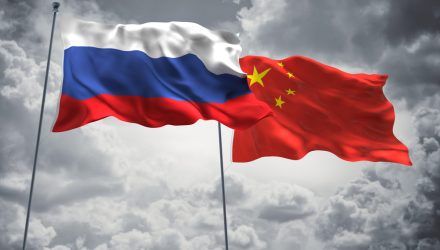The MSCI Emerging Markets Index is on the move higher with China and Russia leading the way as the world looks to recover from the coronavirus pandemic. After falling below 760 back in March during the sell-offs, the index is now back above 1,000.
“Chinese stocks were the biggest boost to the index, as the country’s business activity recovered steadily,” a RT Question More article noted. “Strong economic readings from China and the US last week had partially restored investors’ risk appetite. That helped markets to offset concerns over an increase in coronavirus cases and new lockdown measures in the developed world. Backed by the energy sector, Russian stocks led gains among markets in Europe, Middle Russia’s RTS index has gained over 30 percent since March.”
When it comes to looking at single country opportunities with exchange-traded funds (ETFs), there’s the Franklin FTSE Russia ETF (FLRU) for Russia exposure. FLRU seeks to provide investment results that closely correspond, before fees and expenses, to the performance of the FTSE Russia RIC Capped Index (the FTSE Russia Capped Index).
Under normal market conditions, the fund invests at least 80% of its assets in the component securities of the FTSE Russia Capped Index and in depositary receipts representing such securities. The FTSE Russia Capped Index is based on the FTSE Russia Index and is designed to measure the performance of Russian large- and mid-capitalization stocks.
For China exposure, one fund to consider is the iShares MSCI China ETF (NasdaqGM: MCHI), which seeks to track the investment results of the MSCI China Index. The index is a free float-adjusted market capitalization-weighted index designed to measure the performance of equity securities in the top 85% in market capitalization of the Chinese equity securities markets, as represented by the H-shares and B-shares markets.
Broad Exposure to EM
When looking for more broad exposure to emerging markets versus single country exposure, one fund to consider for broad-based emerging markets exposure, but with less volatility risk is the FlexShares Emerging Markets Quality Low Volatility Index Fund (QLVE). QLVE seeks investment results that correspond generally to the price and yield performance, before fees and expenses, of the Northern Trust Emerging Markets Quality Low Volatility IndexSM.
The underlying index is designed to reflect the performance of a selection of companies that, in aggregate, possess lower overall absolute volatility characteristics relative to a broad universe of securities domiciled in emerging market countries. Under normal circumstances, the fund will invest at least 80% of its total assets in the securities of the underlying index and in ADRs and GDRs based on the securities in the underlying index.
For more market trends, visit ETF Trends.


